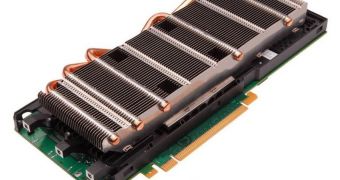While it is busy promoting consumer graphics, NVIDIA has also snared a deal on the supercomputing front, where it has sealed a contract through which the “Titan” will use its Tesla accelerators.
GPU computing modules have gained a role in supercomputing thanks to their immense parallel processing capabilities.
NVIDIA's series of such products bears the name of Tesla, of which the Tesla M2090 will be used for the upgrade of the Jaguar.
Based at the Oak Ridge National Laboratory (ORNL), this supercomputer, which was once at the front of the Top500 list, will be upgraded with 960 such GPUs as part of the first phase of creating the Titan.
The ultimate goal is to enable peak performance of more than 20 petaflops, two times faster than the current top HPC installation, the Japan-based K.
The 960 Tesla will act as complements to the multi-core CPUs of the Cray XK6-based supercomputers.
“Oak Ridge’s decision to base Titan on Tesla GPUs underscores the growing belief that GPU-based heterogeneous computing is the best approach to reach exascale computing levels within the next decade,” said Steve Scott, chief technology officer of Tesla products at NVIDIA, referring to computing performance levels of 1,000 petaflops.
“The Tesla GPUs will provide over 85 percent of the peak performance of Titan. You simply can’t get this level of performance in a power- and cost-efficient way with CPUs alone.”
Speaking of energy and cost efficiency, the Titan will be three times more efficient than K.
As for the second phase (will start in 2012), Oak Ridge intends to go as high as 18,000 Tesla GPUs based on the next-generation “Kepler” architecture.
“All areas of science can benefit from this substantial increase in computing power, opening the doors for new discoveries that so far have been out of reach,” said Jeff Nichols, associate laboratory director for Computing and Computational Sciences at Oak Ridge National Laboratory.
“Titan will be used for a variety of important research projects, including the development of more commercially viable biofuels, cleaner burning engines, safer nuclear energy, and more efficient solar power.”

 14 DAY TRIAL //
14 DAY TRIAL //